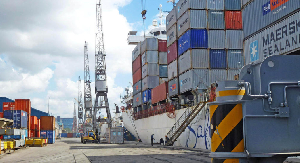Accra, Sept. 20, GNA - The issue of huge spread between the Bank of Ghana prime rate and the base rate of commercial banks took centre stage at a forum on Wednesday with captains of industry calling for direct Central Bank intervention to help to reverse the trend.
Mr Tony Oteng-Gyasi, President of the Association of Ghana Industries, told the Forum called to receive proposals for private sector operators for input into the 2007 Budget that a legislation to limit the spread between the Central Bank prime rate and the base rate of commercial banks was required since market forces had so far failed to force the interest rate down at a fast pace.
"I am told that our Central Bank prefers waiting for market forces to take us where we want to go. However, if we seek rapid growth, we cannot always wait for the market to take us at its own pace," he told participants at the Ministry of Trade and Industry organized forum. The Association is also asking the Central Bank to set minimum and maximum bands for all bank charges, while steps are also taken to abolish ad-valorem bank charges.
Mr Oteng-Gyasi said these moves were necessary to reduce the cost of credit to the private sector and to provide a conducive atmosphere for the manufacturing sector, which sluggish performance needed to be enhanced to propel economic growth.
The manufacturing sub-sector grew by five per cent in 2005; which private sector operators considered very low if the country were to become a manufacturing hub in the West Africa Sub-Region. He said the premise for the proposals was to minimize the financial burden on manufacturing, whether in the form of taxes or operating costs.
"In particular tax revenue should come from consumption rather than manufacturing. The global trend is to minimize the cost of doing business in every possible way and rigidly enforce collection of corporate and income taxes and VAT."
There is also the need to encourage migration of businesses from the informal sector to the formal sector.
Mr Oteng-Gyasi also called for the lowering of the excessive excise duty on locally manufactured cigarettes to make the smuggling of the product into the country unprofitable.
In addition, the AGI is also fighting for extension to local industries the concession that allows Free Zones companies to defer payment of import duty on raw material until the products are sold. Mr Oteng-Gyasi suggested starting the programme with selected manufacturers, who had good track record of keeping their obligations. Other concerns expressed were the calls for the removal of cumbersome and expensive duty draw back scheme and VAT and import duty on some pharmaceutical ingredients as well as the exemption of equipment and raw material from the destination inspection levy.
Besides, they said, the Government must make provision in the budget for permanent solution to the energy crisis. Mr William Atta Krofah, President of the Ghana National Chamber of Commerce and Industry, called for the establishment of one tax audit unit to remove the multiplicity of tax auditing.
In addition, there must be a special fund to allow for quick refunds to companies, which had paid their taxes in excess. Mr Fred Adongo, Executive Secretary of Federation of Ghanaian Exporters, said adequate budgetary allocation must be made to ensure smooth implementation of the country's trade policy, which, he said, had all it took to move the private sector to the pinnacle.
Mr Alan Kyerematen, Minister of Trade and Industry, Private Sector Development and President's Special Initiatives, said a private sector dialogue unit had been created within the Ministry to allow for regular consultations with captains of industry to know their concerns through bi-monthly breakfast meetings with the Cabinet and President John Agyekum Kufuor.
The unit would also institute semi-annual trade forum and also sectoral meetings with various stakeholders to discuss issues that affect the smooth running of the sector. 20 Sept. 06
Business News of Wednesday, 20 September 2006
Source: GNA












